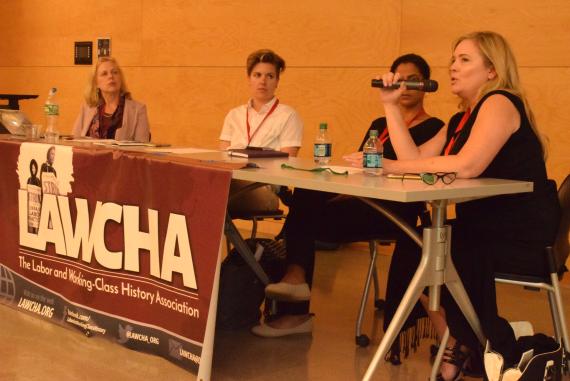For four days this summer, the University of Washington became the worldwide center for the study of labor and working-class history. More than 500 scholars, activists, community members, and labor organizers from around the county and the globe came to campus to attend the Scales of Struggle conference, hosted by the Labor and Working-Class History Association (LAWCHA). The vibrant meeting, which stretched from June 22 to June 25, featured nearly 100 panels, workshops, films, and performances, along with five plenary sessions. Scholarship presented at the conference spanned more than three centuries and covered a broad array of themes, with four highlighted in particular: War and Empire, Borders and Coalitions, Struggling for Justice and the Public Work of Labor History. The conference also emphasized a range of organizations and sites of struggle, from collective action at the workplace to social movements, from direct action to educational campaigns, from local alliances to transnational coalitions.
The Department of History, as well as the UW Social Sciences Division, played a pivotal role in the planning and the execution of the event, providing financial support and volunteers. The Harry Bridges Center for Labor Studies, led by Director Michael McCann, a faculty member in the Department of Political Science, and Associate Director Andrew Hedden, a History doctoral student, served as conference host. Theresa Mudrock, the UW History Librarian, designed and produced the conference printed program. History doctoral students Michael Aguirre, Josué Estrada, Andrew Hedden, Roneva Keel, and Michael Reagan presented papers. Professors Dan Berger, Susan Glenn, James Gregory, Moon-Ho Jung, Polly Reed Myers, and Ileana Rodriguez-Silva participated in panels and discussions.
History Professor James Gregory, a well-known scholar in the fields of labor and migration studies and currently the president of LAWCHA, coordinated the conference from start to finish. In his opening remarks, Professor Gregory stressed why the city of Seattle was such an appropriate place to host the meeting. “Seattle is the right place for this gathering. It offers recent and historic examples of smart and effective struggles that have won victories for working people. This is a city where unions remain strong and where movements for social justice exert influence both in policy and public imagination. And it is a city that embraces its labor history.”
To find out more about LAWCHA, including a lively blog, resources for teaching labor history and more, visit www.lawcha.org.
